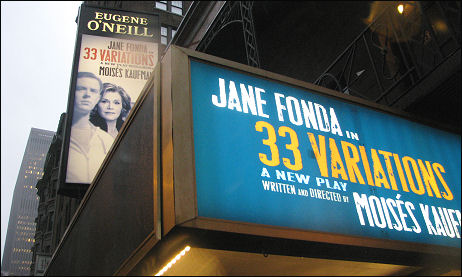Jane Fonda must be feeling like $10 million bucks these days. Make it $100 million. 33 Variations, the Broadway play I saw her perform in this afternoon, is a bracingly well-written, inventively staged, and deeply moving piece about fighting the demons of finality while living to the fullest, and it’s given Fonda’s comeback effort (which began about five years ago, give or take) the lustre and respectability that Hollywood failed to provide with Monster-in-Law (’05) and Georgia Rules (’07).

Fonda, yes, agreed to star in these films of her own free will but God, what a putrid and fallow place Hollywood can seem at times, especially from the perspective of the New York stage. But there’s nothing like a crackerjack Broadway play to put the rose back in everyone’s cheeks.
How good is Fonda? Very. She’s obviously deeply into what this play is about — love, passion, giving your utmost until the last. She’s confident, focused, commanding, and very connected. But so are costars Samantha Mathis, Colin Hanks (his first Broadway role), Zack Grenier, Don Amendiola and Susan Kellerman.
Directed and written by Moises Kaufman, 33 Variations doesn’t officially open until March 9th, but I can at least offer some generic alpha vibes at this stage of the game. It’s a good thing all around for Fonda, her costars, Kaufman and the audience. I left the theatre an hour or so ago feeling more than a little turned on. (I can’t do anything about the asswipes out there who will interpret that to mean something other than spiritual arousal.) The first thing I said to Roger Durling, who saw it with me, was, “I could see that again.”
Fonda plays Katherine Brandt, a somewhat emotionally remote music scholar (at least as far as Clara, her daughter, is concerned) trying to understand why Ludwig van Beethoven — whose career and powers were beginning to decline, and who needed money — spent 3 years writing 33 variations on a mediocre waltz written by a music publisher in 1819.
Kaufman’s play is an ensemble piece, however, and this involves putting Beethoven himself (Grenier) as well as his assistant Schindler (Erik Steele) as well as Diabelli (Amendolia), the original composer of the mediocre waltz, smack dab alongside the present-day characters.
Brandt’s quest, which takes her to Bonn, becomes a race against time since she’s facing a severe health problem in the form of Lou Gehrig’s disease. The gradual falling of the curtain obviously affects her relationship with Clara (Mathis) and increasingly involves her daughter’s good-guy boyfriend Mike (Hanks), a nurse, as well as a soulful German woman (Kellermann) who watches over Beethoven’s archives in Bonn.
The play, okay, could use a tiny bit of refining here and there, but it’s really quite together at this point. I was delighted how a straight play about a gifted composer who understood dance and song would include a communal sing-along at one point (which reminded me of the singing of “Wise Up” in Paul Thomas Anderson‘s Magnolia) as well as a tender little dance number.
